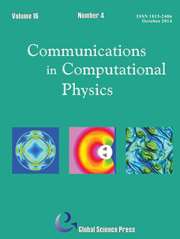Article contents
The Kinematic Effects of the Defects in Liquid Crystal Dynamics
Published online by Cambridge University Press: 22 June 2016
Abstract
Here we investigate the kinematic transports of the defects in the nematic liquid crystal system by numerical experiments. The model is a shear flow case of the viscoelastic continuummodel simplified fromthe Ericksen-Leslie system. The numerical experiments are carried out by using a difference method. Based on these numerical experiments we find some interesting and important relationships between the kinematic transports and the characteristics of the flow. We present the development and interaction of the defects. These results are partly consistent with the observation from the experiments. Thus this scheme illustrates, to some extent, the kinematic effects of the defects.
MSC classification
- Type
- Research Article
- Information
- Copyright
- Copyright © Global-Science Press 2016
References
- 4
- Cited by


